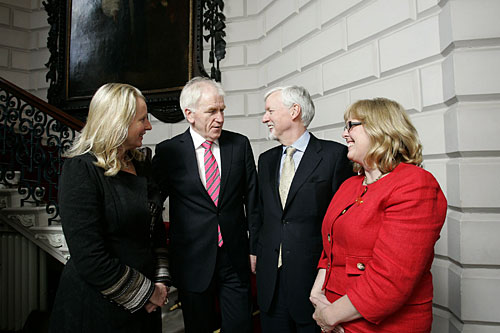New Masters in Public History and Digital Humanities Launched by Minister for Arts, Heritage and Gaeltacht Affairs
Posted on: 01 June 2011
The Minister for Arts, Heritage and Gaeltacht Affairs, Jimmy Deenihan, launched two new postgraduate Masters programmes, in ‘Public History and Cultural Heritage’ and ‘Digital Humanities and Culture’ at Trinity College Dublin on May 31st last that will add a new dynamic to the development of Ireland’s Cultural Heritage.
The programmes have been developed under the umbrella of Trinity’s Creative Arts, Technologies and Culture initiative and are an outcome of the new partnership between the university and some of Ireland’s leading cultural institutions located in close proximity at the centre of Dublin. The National Library of Ireland, the National Museum of Ireland, the National Archives of Ireland, Dublin City Gallery Hugh Lane, Dublin City Public Library and Archive Services and the Chester Beatty Library among others will collaborate with Trinity in the development of these new programmes.
Students will pursue courses in Trinity in established research areas such as History, English, Languages and Cultural Studies, and Computer Science while undertaking internships in the cultural institutions and gaining practical experience of working in the cultural heritage industry.
In the digital area, Trinity is working closely with some of the major IT companies, IBM, Intel and Microsoft. On completion of the Digital Humanities and Culture course, students will have highly specialised IT skills in relation to text, images, audio, and video.
The graduates of these new programmes, highly skilled and rigorously trained, will represent an important pool of expertise for the creative industries and cultural sector especially in the current economic climate.

Director of the National Library of Ireland, Dr Fiona Ross, Minister Deenihan, Provost John Hegarty and Prof Jane Ohlmeyer
Commenting on the significance of the new Masters Programmes, Minister Deenihan said: “Cultural Heritage is a major industry for Ireland. The Book of Kells in Trinity, for example, is the second most popular tourist attraction attracting 600,000 visitors per annum. These Masters Programmes will feed directly into this all-important industry. They will promote job creation in areas as diverse as curation, cataloguing, digital archiving and data-mining. The skill sets needed to engage in these disciplines are rare, and Ireland now has the potential to become a world leader in this area.”
On the occasion of the launch, Minister Deenihan also announced a series of bursaries financed by his Department to be awarded by the National Library of Ireland for students taking the Masters Programmes. The students who receive these bursaries will hold their internships at the National Library. “The National Library of Ireland is putting in place six bursaries in cooperation with the Department of Arts, Heritage and the Gaeltacht. These bursaries, three for each course, reflect the close working relationship between Trinity and the NLI since the joint appointment of a Cultural Co-ordinator. The total value of the bursaries is €20,000,” concluded Minister Deenihan.
Describing the new courses, Trinity’s Professor of Modern History, David Dickson, the academic leader of the ‘MPhil in Public History and Cultural Heritage’ explained: “It will involve the study of cultural memory and the public status of history in modern society. It will examine the political issues surrounding public commemoration and the role of museums, archives, galleries and the media in shaping public perceptions of the past. It will also survey the more concrete questions involved in the conservation, presentation and communication of the physical heritage of past cultures, particularly where interpretation and meaning are contested.”
Senior Lecturer in Digital Humanities at Trinity, Dr Susan Schreibman, the academic leader for the ‘MPhil in Digital Humanities and Culture’ explained that “it is a new and dynamic interdisciplinary field of study at the intersections of humanities and computer science opening up possibilities for research that could only have been dreamed about a generation ago.”
The courses will commence next September, and the deadline for application for the Public History and Cultural Heritage course is 30 June 2011. Late applications are being accepted for the Digital Humanities and Culture course until places are full.
